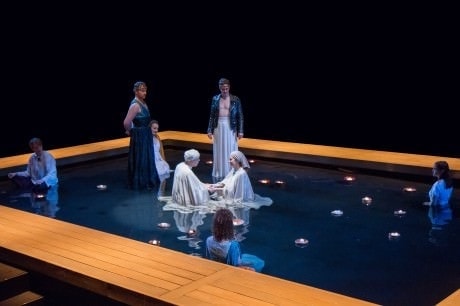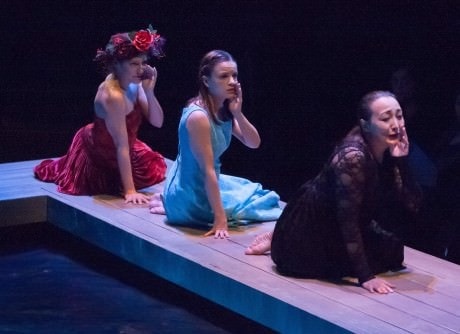Zimmerman and Ovid Transform Arena Stage
The first thing you notice of course is the pool: you can smell it before you go in; you can feel the water in the air. Ten yards by twenty yards maybe. The bottom and the sides are black, so it’s hard to judge depth, but there’s a chair at one end and only a few inches of its legs appear to be underwater. The pool (created by Scenic Designer Daniel Ostling) framed by a deck of planks, fills the entire playing space, and the Fichandler’s four sections of seats flare up and out from the deck like the sides of a hopper. It would be a good place for a boxing match.

The next thing you notice is the light: most of it bounces off the quivering water at irregular angles that make it hard to tell where the light is coming from, but some of it goes through the surface and stays in the water, so that the pool itself becomes a source of light, with lines of shadow on the moving surface. And then the heat: I took off my sport coat before I sat down, and I’ve begun to open buttons on my shirt. A woman in front of me is wearing an expensive dress that leaves her neck and arms and shoulders bare, her skin a smooth expensive clothing.
Then you realize that none of it is necessary — the pool, the heat, the bouncing light. You realize that playwright Mary Zimmerman has set the play in water just because.
That’s when you begin to feel the thrill.
Metamorphoses, written by Ovid, translated by David Slavitt, and adapted for the pool by Zimmerman, is a series of mythic vignettes that answer simple questions, the kind we asked when we were children — why do seagulls seem to kiss the surface of the water? Why do trees seem to whisper at night? – the sort of question we stopped asking when we opened our retirement accounts and swore off all trans fats. Questions we might post on Facebook if our children asked them now, along with smiley-face emoticons.
But because the pool is not required by the narratives, these stories make us yearn to frolic in the waters from which we emerged — and they make us believe that we can.
“Before there was water and dry land, or heaven and earth, nature was all the same,” says a woman in a lab coat. She shakes a gallon jar that’s full of muck to show what it was like before: chaos. Then some god struck a light and “a twinkling template of order” was imposed upon the world — that’s how we know that trans fats cause heartache, and that compound interest is the only way to make our money last, and that when the woman in the lab coat puts the jar of chaos on the deck, the dirt will sink and the water will rise. It does and it does. It always does.
And now suddenly it doesn’t!
I’m inclined to say that Zimmerman treats water as if it were land, but that’s not true: she splashes it and floats things on it and flops people into it as she would never flop a person onto the hard boards of a stage. Neither does she treat water as if it were just like land: many of the play’s loveliest images – carefully constructed images – derive from the sound of water, or from the way it interacts with light, or from the principle of buoyancy – no, not the principle: from buoyancy itself. All she does is put a chair in water, and then a table, and then a group of actors who are not swimming or fishing or surviving a flood, who are doing things that people do on land that is, she remixes chaos – and the whole twinkling template of order dissolves in a thrill.
“A paradise, it would seem,” Zeus says. The water was here and the land was there, each with its own population, agenda, and purpose, and chairs were not in water anymore, except for that chair with the velvet cushion and the arms and legs that look like they were carved by hand. Etruscan oak. One thing was lacking, Zeus says: words. Man was made so he could speak them, making stories that tell humans and immortals what to think about the world.
“It’s been said that myth is a public dream,” explains the therapist who treats Apollo’s son. “Unfortunately we give our mythic side scant attention these days. As a result, a great deal escapes us, and we no longer understand our own actions.” Neither do we understand why all of this is happening in water — or why we like to play in water, or to watch it, or to listen to it, or to splash it onto people in the first few rows.
The stories that comprise this play are all about extraordinary hunger — for gold, for love, for sex, for people, for purpose, for hope. The characters are humans and gods and the children of gods, who yearn and fear and hunger just like people.
Only one of the stories involves a body of water. Alcyone begs her husband Ceyx not to go to sea: “If you die, my life is over,” she insists.
“I’ll be back in two months’ time,” her husband says.
Oarsmen appear and start to row on one side of the pool, and the narrator pulls a model boat over the surface of the water until “Poseidon and his henchmen arrived and the rest was one enormous green catastrophe.” They lift Ceyx up and smash him down into the water again and again, drenching the people in the front rows and finally holding him under until the struggle stops. It’s beautiful and terrifying.
The best-known tale is Orpheus descending to the underworld to beg for more time with Eurydice. “I’ve tried to master this grief,” he says to Hades, on his knees under a shower of water, “and I can’t. My bride Eurydice will soon enough be your citizen in the ripeness of her years. I’m asking for a loan, not a gift.” And for some reason, sentimental Hades lets her go, on the condition Orpheus not look at her until she makes it through the gate.
“Is this the story of love and how it always goes away?” the narrator asks. “Is it the story of how time can move in only one direction? Is it the story of an artist and the loss that comes from sudden self-consciousness or impatience?”
The soul wanders in the dark until it finds love, another character suggests — if we’re lucky and we let ourselves be blind instead of always looking out.
Myrrha isn’t lucky. She hungers for her father in a way that makes her hate herself. “Oh gods, I pray you, keep off this wickedness…. Why do I keep thinking of such things?”
Instead of keeping off the wickedness, Aphrodite tells Cinyras, Myrrha’s father, that a young girl wants to sleep with him while his wife is out of town. “But she’s very shy and is afraid for you to see her,” Aphrodite says. So Cinyras ties a scarf around his face, and in the darkness Myrrha comes. The way they use the water makes you want to take a shower with your wife.
One night. Two nights. Three.
“Oh, gods, I pray you,” Myrrha cries, “change me; make me into something else; transform me entirely; let me step out of my heart!”
“Someone must have heard her prayer,” Vertumnus says, “for she did change.” Some say she changed into a tree, some say she gave birth to Adonis, some say she simply dissolved in her own tears.
“And this last was no mere expression or poetic hyperbolic trope,” says Aphrodite, “but simply the unadorned terrible truth. She stepped into a shimmering stream and her body melted.” At which point Myrrha slips beneath the surface of the water and apparently dissolves.
Zimmerman herself directs a fabulous cast for this new production, which includes much of the original cast that premiered the play at Lookingglass Theater in Chicago twelve years ago, or in the 2012 revival at Lookingglass, or in the Off-Broadway and/or Broadway productions: Raymond Fox, Douglas Hara, Derek Hasenstab, Chris Kipiniak, Louise Lamson, Ashleigh Lathrop, Lauren Orkus, Geoff Packard (a Helen Hayes Award recipient for playing Candide in Candide at Shakespeare Theatre Company), Lisa Tejero, and Tempe Thomas. Costume Designer Maria Blumenfeld, Lighting Designer T.J. Gerckens, Sound Designer Andre Pluess, and Willy Schwarz’s original music enhance the beauty of this production.

This is the first time Zimmerman has directed the play since its year-long Broadway run, and the first time it has been staged in the round. It’s only ninety minutes long, but because it takes you to another time within yourself, it seems to last for hours. When you realize that you’ve reset your clock to ordinary life again, you wonder how long it will take you to get home, and where you live, and whether it’s a place where land is separate from water.
Running Time: Ninety minutes with no intermission.
Metamorphoses plays through March 17, 2013 at Arena Stage at the Mead Center for American Theater – 1101 Sixth Street SW, in Washington DC. For tickets, call the box office at (202) 554-9066, or purchase them online.




